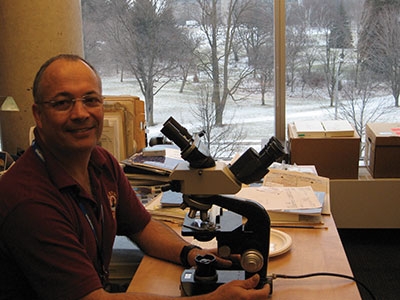
Digital Education on Coccidiosis
By Treena Hein
Features Research Welfare Biosecurity Business/Policy Canada ProtectionA unique education program is being created to provide targeted information for coccidiosis control
 Parasitologist Dr. John Barta of the University of Guelph is a committee member for the Knowledge Translation and Transfer (KTT) program. Kayla Price
Parasitologist Dr. John Barta of the University of Guelph is a committee member for the Knowledge Translation and Transfer (KTT) program. Kayla PriceWhere you find any kind of poultry across the world, you will find the Eimeria parasites that cause coccidiosis. It’s a global “everyday” production problem that impacts both poultry gut health and performance, with significant economic ramifications.
“The problem of coccidiosis and how to manage it depends on a large variety of factors,” notes Kayla Price. “And without a basic understanding of the parasite, there can be confusion in how to deal with it.”
Price is a University of Guelph doctoral student researching coccidiosis management and control, supervised by parasitologist Dr. John Barta.
Coccidiosis presents her with an opportunity to make a difference in the industry. “Prophylactic drugs are the current prevention program of choice for this disease, but concerns with resistance and drug residues may limit their future use,” Price notes. “Vaccination is a good solution but, to be fully effective, producers must have a basic knowledge of the parasite and how to manage it.”
In-person training for all poultry workers who have direct involvement with Eimeria management, whether in the hatchery, at feed companies or in the barn, is difficult – and expensive. Training programs can also vary in style, may consume too much time, and may not adequately address the concerns of all poultry operations.
With that in mind, Price is spearheading a project, funded by the Ontario Ministry of Agriculture and Food’s (OMAF) Knowledge Translation and Transfer (KTT) program, the Poultry Industry Council and members of the poultry industry. It has brought together interested professionals from industry, government and academia to create a self-guided, educational tool to meet the needs of large and small flock producers, hobby farmers and game bird farmers. “A knowledge disconnect exists between the end-users that must deal with the negative impact of the parasite on their flocks and those who understand the parasite,” Price explains.
The answer is to create materials that encompass the entire diverse nature of the poultry industry that are compiled, streamlined and presented in an accessible way.
The project’s outcome will be an educational DVD and a smartphone-accessible website thanks to help with storyboards and the outline from a group of undergraduate, graduate and veterinary students. “In April, we met with interested stakeholders to present our ideas and gather input – it’s a true collaboration,” Price says.
She stresses that the aim is not to replace veterinarians or company representatives, but to provide reliable and focused education. “It’s about tapping the knowledge and expertise of those in industry, academia and government to build enhanced understanding of the parasite and how to implement best practices for proactive management of the parasite,” she notes.
Changes in feed and the potential for changes in housing and management styles (for example, moving to an alternative systems for layers) can also have an impact on parasite management. “It’s therefore very important for there to be a comprehensive, interactive and scientifically sound resource for those making production‑style changes or who wish to change their current coccidiosis prevention program,” Price says.
Price says what makes this program unique to Canada and the world is that it will present a general overview of coccidiosis and its management, as well as provide targeted information for as many production system styles and control methods as feasible. “While government websites of other countries have some resources related to coccidiosis and poultry, to our knowledge, nothing is as comprehensive as the resource we are developing,” she explains. “Coccidiosis prevention companies do provide information related to control, but this information may not be targeted to all of our intended audience.”
She says their materials will be agenda-free, address the climatic and other challenges of Canadian poultry production, and also be customized to size and style of operation. “Each end-user will be able to pick a selection of video segments or web pages that best apply to them,” she notes.
A thriving poultry industry, in Price’s mind, requires constant scientific innovation to drive success. “The link between academia and industry is therefore critical, especially in matters of poultry health,” she says. “The Knowledge Translation and Transfer program is a great way to make sure these innovations and collaborations with industry are introduced to the target audience in a dynamic way. This project is a great way to learn how to make research accessible and useful to the public, to help them do better.”
The KTT project committee members include: Ms. Kayla Price (Dept. Pathobiology, University of Guelph), Dr. Gregoy Bédécarrats (Dept. Animal and Poultry Science, University of Guelph), Dr. Michele Guerin (Dept. Population Medicine, University of Guelph), Dr. Csaba Varga (Ontario Ministry of Agriculture and Food), Mr. Kobus Van-Heerden (Ceva Animal Health), Ms. Laura Bowers (Poultry Industry Council) and Dr. John Barta (Dept. Pathobiology, University of Guelph).
Print this page